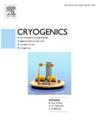一种模拟制冷机非状态热力学的实验方法
IF 2.1
3区 工程技术
Q3 PHYSICS, APPLIED
引用次数: 0
摘要
我们提出了一种方法,模拟在冷却器的间歇操作的情况下,低温冷却器的热力学行为。例如,这种间歇操作可以应用于在冷却超敏感设备时防止冷却器干扰。在这种情况下,在这些设备的实际操作期间,冷却器是关闭的。由于这些设备通常对温度变化很敏感,因此了解冷却器在打开和关闭时的热响应是很重要的。我们预测这种反应的方法是基于单独冷却器阶段的简单RC模型,其中热阻R和热容C被认为与温度有关。为了确定这些依赖关系,冷却器在预热实验中具有特征,其中冷阶段温度记录为时间的函数。在本文中,我们提出了我们的建模方法和从预热实验中推导模型参数的方法。用商用两级制冷机进行的实验说明了所提出的方法。本文章由计算机程序翻译,如有差异,请以英文原文为准。
An experimental method for modelling the off-state thermodynamics of a cryocooler
We present a method for modelling the thermodynamic behaviour of a cryocooler in the case of intermittent operation of the cooler. Such intermittent operation can, for instance, be applied to prevent cooler interference when cooling ultra-sensitive devices. In this case, the cooler is switched off during actual operation of these devices. Since these devices usually are sensitive to temperature variations, it is important to know the thermal response of the cooler when switching it on and off. Our approach in predicting this response is based on simple modelling of the separate cooler stages, in which the thermal resistance and the heat capacity are considered temperature dependent. In order to determine these dependencies, the cooler is characterized in warm-up experiments where the cold-stage temperatures are recorded as functions of time. In the paper, we present our modelling approach and the method to derive the model parameters from the warm-up experiments. The presented methodology is illustrated by experiments performed with a commercial two-stage cryocooler.
求助全文
通过发布文献求助,成功后即可免费获取论文全文。
去求助
来源期刊

Cryogenics
物理-热力学
CiteScore
3.80
自引率
9.50%
发文量
0
审稿时长
2.1 months
期刊介绍:
Cryogenics is the world''s leading journal focusing on all aspects of cryoengineering and cryogenics. Papers published in Cryogenics cover a wide variety of subjects in low temperature engineering and research. Among the areas covered are:
- Applications of superconductivity: magnets, electronics, devices
- Superconductors and their properties
- Properties of materials: metals, alloys, composites, polymers, insulations
- New applications of cryogenic technology to processes, devices, machinery
- Refrigeration and liquefaction technology
- Thermodynamics
- Fluid properties and fluid mechanics
- Heat transfer
- Thermometry and measurement science
- Cryogenics in medicine
- Cryoelectronics
 求助内容:
求助内容: 应助结果提醒方式:
应助结果提醒方式:


